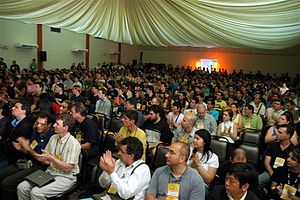
This month’s “Ask the Chefs” asks our corps of intrepid seat-fillers to reflect on which conferences and meetings they attended and identify their favorite, the best, or the most memorable of the lot. The question posed:
“What was the best meeting you attended this year, and why?”
I quickly had to clarify that “meeting” meant “conference,” because we’re all in so many meetings (some very good ones, mind you), that the distinction was necessary.
As usual, answers are provided in the order received. Also, please remember that because we’re a blog, you’re welcome to add your favorite conference and a description via the comments.
Joe Esposito: The best conference I attended in 2011 was the American Association of University Presses (AAUP) annual meeting in Baltimore in June. The AAUP meetings are well organized, well attended, and productively focused. The sessions include presentations on trends and new technology, but also working groups for specific tasks that all presses have to undertake. I think the educational value of the meeting is very significant, especially for some of the smaller presses, which lack the resources to learn some of these things on their own. The conference is also a networking opportunity, but its real value is to serve as an anchor for the press community at large.
Tim Vines: I’ve only got three to pick from, but my favourite meeting of the year so far is the one I’m currently at — the 4th Congress on DNA Barcoding in Adelaide, Australia. The basic idea is that all organisms can be distinguished by their DNA, and hence you can take a twig or feather and work out which species it belonged to. The concept itself is decades old, but the campaign to catalogue a barcode from every species on earth began in earnest in about 2004. Despite the enormity of the task the barcoders have set about it with great energy and discipline, and this conference marks the first time they’ve had to deal with the consequences of their success: over a million species have been barcoded, but a significant proportion of them have been mis-identified. Should barcoders go back and make sure it’s all perfect, or, considering there are another 20-50 million species remaining, throw caution to the wind and plough on? It’s going to be an interesting few years.
Kent Anderson: This year was unusual for me, in that I didn’t attend many conferences, choosing to take a year off the speaker’s circuit, which led to less travel and less meeting attendance. That said, the most memorable meeting for me of the year was the Silverchair Colloquium, for reasons both personal and professional. To make the meeting, I had to take a red-eye from San Diego, ride for two hours in a car from Dulles, to arrive in one of the nicest hotel rooms I’ve ever seen — the entire stay in said two-balcony, sweeping view, plush decor room lasted 45 minutes, time enough to shower, eat two pancakes, and have my suit pressed. I joined the meeting as one of my intellectual heroes, Clay Shirky, was speaking, and was able to ask him a couple of questions. I was also able to see many other smart people, including an in-law who I’d convinced to attend (and immediately realized what a smart in-law I have), our lead consultant from IDEO, and a lead editor from the Guardian, with whom I shared a shuttle back to the airport and a lengthy wait at the gate, during which conversation simply flowed. I’ll never forget this combination of travel craziness, in-law reunion, and really smart people with important things to say and ask.
David Wojick: I don’t travel to conferences; in my house we call this “body porting.” My conferences occur on blogs, and over the last year the best have been on (guess what) the Scholarly Kitchen, which I liked so much that I joined up. Conferences are all about new ideas and deep discussions. Of the many useful Kitchen discussions I participated in, I would say the best is this one: “Are Open Access and Traditional Publishers in the Same Business?” led by our ringmaster (or trainer?) Kent Anderson. This discussion built on a number of prior exchanges, over several months, which is just what deep thinking requires. Not that we resolved anything, but we certainly surfaced an important idea, as conferences are meant to do.
Ann Michael: From an educational perspective, the best conference I attended in 2011 was South-by-Southwest (SXSW) Interactive. If you want to explore diverse possibilities and see what people, mostly very far removed from scholarly publishing, are doing or thinking about doing, I highly recommend attending SXSW at least once. We all get so caught up in our day-to-day responsibilities and challenges that it’s hard to carve out time to consider alternate opinions and reflect upon how they might apply us. In fact, the normal pace and pressures of of our environment usually cause divergent ideas to get squashed quickly. SXSW is a great antidote for that. Sessions I attended this past year included: “People as Peripherals (Mouse, Touch, Gesture, Bio),” “My Prototype Beat-up Your Business Case,” and “Don’t Listen to the Customer.” What impressed me the most was that often, even within the sessions themselves, opposing views were discussed, the audience participated, and in many cases we started to envision how we might beneficially balance different approaches. Great stuff! I do have to warn you though — it’s pandemonium! The conference is huge and spread out between several locations in downtown Austin. There is no way to know everything that’s happening at or around the conference. Make a plan and then be open to serendipity. I guarantee that if you go with an open mind, focus on the meeting, and engage in discussion with the people around you, it will be worth it.
Michael Clarke: I don’t have a single best meeting. A few particular talks stick out for me however. These include Clay Shirky’s talk at the Silverchair Colloquium on the attention economy and its impact on STM publishing, Tim Lloyd from Alexander Street Press’s talk at the SSP Annual Meeting on semantic metadata in video archives, Rob Wolcott’s talk at Silverchair Strategies on strategic positioning, Tim O’Reilly’s talk at Silverchair Strategies on the transformation of publishing from product-centric to service-oriented, and Conrad Wolfram’s talk at STM Innovations on the Computable Document Format. I think every one of these (except for Rob Wolcott’s talk) are available via online video.
Phil Davis: I’ve been enjoying smaller meetings with tightly focused agendas, where participants have vested interests in the topic, more time is spent on Q and A, sessions are not recorded and uploaded for the world (and oneself) to critique, and where, as a result, people feel more free to speak their minds.
David Smith: The best meeting I attended this year was Strata (http://strataconf.com/strata2011), the inaugural big data conference that O’Reilly Media put together. So many things were discussed there that publishers need to be paying serious attention to:
- analytics-driven business, where insights from data are used to drive revenue, hypotheses are constructed tested and modified according to the data that comes back from those tests
- the use of the cloud to solve problems that until the advent of cheap on demand distributed computing had been beyond serious consideration
- how direct and indirect information sources can be used to build high value business propositions (check out the recorded future: http://www.recordedfuture.com/)
- what vital new skillsets will be needed to survive thrive and prosper in this nascent economy
Distributed computing and big data is the Watt steam engine of the information age.
Just the other week, the list of the top 500 super computers was released. In at number 42 (seriously!) was Amazon. Yes, the little “mail order Internet company that could” has themselves a supercomputer, and a big one, too. But more than that, you have access to it if you want. For $2500 an hour, you can use this 240 teraflop behemoth of processing. In an odd inversion of the industrial revolution, the information revolution will move people from big conglomerations of people in buildings, back to small distributed cottages, flats, bedrooms, and basements. Strata was where the first systematic discussions about this new world occurred.
Discussion
2 Thoughts on "Ask the Chefs: "What Was the Best Conference You Attended This Year, and Why?""
This is only the second year I have attended the Charleston Conference, but I now understand why this conference is so popular. It is one of the few places where publishers and vendors get a chance not only to speak with librarians in the exhibit room but also be active participants in the program themselves. This level of participation ensures that diverse perspectives are presented on the many hot topics that get discussed, such as PDA for a second straight year. I had the honor of chairing a plenary session on the DPLA featuring Robert Darnton and Rachel Frick, and afterward Darnton and I joined Charleston major domo Katina Strauch over lunch, which gave me a chance to catch up with Darnton whom I hadn’t met face to face in quite a few years. As usual, conversations in the hallways were a bonus, and i came away from one of these conversations with the idea for a book I’d like to write on the irrationality of universities as participants in the scholarly communication system, an idea that i have proposed to Princeton University Press.



